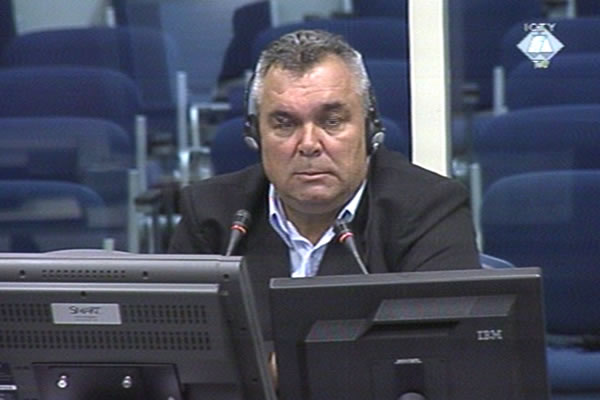Home
MENDELJEV DJURIC’S ‘CATEGORICAL DENIALS’
In his evidence at Radovan Karadzic’s trial, Mendeljev Djuric Mane ‘categorically’ denied that he had participated in disarming the Muslims from Srebrenica, separating the men from the rest of the refugees in Potocari and other crimes he was convicted of by the BH State Court. He is currently serving his 30-year sentence
 Mendeljev Djuric - Mane, defence witness of Radovan Karadzic
Mendeljev Djuric - Mane, defence witness of Radovan Karadzic Mendeljev Djuric Mane, former commander of the 1st Detachment of the RS MUP Special Brigade, is currently serving 30 years in prison as he was convicted by the BH State Court of aiding and abetting the Srebrenica genocide. Today he was brought to The Hague to give evidence at Radovan Karadzic’s trial. The witness testified in the presence of his temporary counsel Miodrag Stojanovic.
According to the summary of the written statement he gave to Karadzic’s defense, on 12 July 1995 Djuric and his detachment were sent to Potocari on the orders of Dusko Jevic Staljin. Their task was to ‘protect the civilians’ from Srebrenica. Djuric and his unit were there until the last bus with the Srebrenica inhabitants left Potocari on 13 July 1995. During that time, Djuric claims he didn’t see or hear anything that would indicate there was a plan to execute the men.
In the cross-examination, Djuric ‘categorically’ denied every last thing that the BH Court had convicted him of. Djuric denied that he had participated in disarming the Muslims, separating the men from the rest of the refugees, detaining the men in the ‘white house’ and preventing UN soldiers from protecting the prisoners. Djuric said he had appealed against the judgment and hoped that the appellate judgment would be more favorable for him.
Djuric was just as emphatic in his denials of the claim that he had told Dutch officer Van Duijn in Potocari the men from the ‘white house’ ‘wouldn’t need anymore’ the documents taken away by the Serb soldiers. Djuric said he ‘could see nothing’ from where he was. As he said, he was just a ‘low-ranking police officer’ and didn’t know what was going on.
At one point, Djuric said that he learned about the separation of men from the rest of the refugees in Potocari much later, after the events in Srebrenica. This prompted the prosecutor to confront Djuric with the audio recording of an interview in which Karadzic’s advisor Jovan Zametica explained to a BBC journalist on 13 July 1995 that the men were separated in order to check if any of them were on the list of war crime suspects. The prosecutor asked Djuric how the people in Pale and in London had known about the separation and he, on the scene in Potocari, had been unaware of it.
Djuric only admitted that an element from his detachment was tasked with securing the road from Bratunac to Konjevic Polje on 12 July 1995. The VRS documents show that thousands of Muslims were captured along that road that night, but Djuric claimed that his men had not arrested anyone.
Djuric even tried to deny that he had been the detachment commander. His official job title was instructor in the special police brigade. The witness neglected to mention this trifling matter in the statement he gave to Karadzic’s defense. Djuric explained to the prosecutor that he didn’t pay attention to what was in the statement. When presiding judge Kwon asked him a question, Djuric readily admitted that Milomir Furtula from Karadzic’s defense team had brought to the prison a ready-made statement for Djuric to sign.
After Djuric completed his evidence, Karadzic’s military expert Dragomir Keserovic returned to court and the accused finished his re-examination. Cedomir Kljajic, a police inspector from Sarajevo, is slated to give evidence tomorrow.Linked Reports
- Case : Karadzic
- 2013-07-25 FORCED TO ‘DISARM PEOPLE FORCIBLY’
- 2013-07-24 PROSECUTION: WRONG CONCLUSIONS BASED ON SELECTIVE SOURCES
- 2013-07-23 KARADZIC’S EXPERT PREPARED TO ACCEPT JUST 500 SREBRENICA VICTIMS
- 2013-07-30 FORMER POLICEMAN’S LAW CAREER
- 2013-07-31 BROTHERS IN ARMS
- 2013-08-01 PLAYING DOWN NUMBER OF VICTIMS AT BRANJEVO
